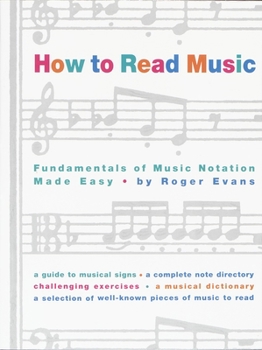How to Read Music: The Fundamentals of Music Notation Made Easy
Select Format
Select Condition 
Book Overview
A basic primer for anyone without musical training who wishes to learn to read musical scores when singing or taking up an instrument. The book explains how notes are named and written; how to read... This description may be from another edition of this product.
Format:Paperback
Language:English
ISBN:0517884380
ISBN13:9780517884386
Release Date:April 1995
Publisher:Crown Publishing Group (NY)
Length:112 Pages
Weight:0.49 lbs.
Dimensions:0.3" x 7.0" x 9.2"
Customer Reviews
6 ratings
Love it!
Published by Melinda , 9 months ago
This book is exactly what I needed!!! I took lessons for 10yrs as a child but haven’t played in 20yrs. I have forgotten a lot of the fundamentals and some notes. This book has everything I need to relearn what I have forgotten. I would gladly refer this book to people
Fool not to own one
Published by Thriftbooks.com User , 17 years ago
After reading some of the foolish comments by some of the "reviewers", here's the honest truth. This is ONE GREAT LITTLE BOOK! It's amazing that so much can be packed in such a short package, but this one does it. Forget about the staff/stave BS. It's irrelevant. I may say quaver or semiquaver half note or whole note. Who cares? If you are this picky then you shouldn't be learning to read music in the first place. I have been teaching all my student using this and earlier editions for about 10yrs now. NEVER had a complaint. BTW, I do agree. It's a GREAT lil reference too. Buy it! Own it!
For a couple previous idiots:
Published by Thriftbooks.com User , 18 years ago
The Staff: Music. A set of horizontal lines and intermediate spaces used in notation to represent a sequence of pitches, in modern notation normally consisting of five lines and four spaces. Also called stave. Thank you dictionary.com :) Don't get caught up on what YOU refer to the staff as, you miss the point of the book.
does what the title says
Published by Thriftbooks.com User , 19 years ago
In the first part, the book covers the basic notation in detail, step by step. Author asks you to do a review and make sure you know all the previous material before attempting musical sight reading exercises. The second part of the book covers the more complex notation found in the classical pieces. It is more fast paced because the author assumes that a reader has accumulated the knowledge from the first part. At the end, there are: a directory of musical signs, a directory of all notes on the piano and guitar, and a short musical dictionary. Very handy reference. Are there better books on the topic? I do not know. I'm not an expert. In my opinion the book does what it advertises. You'll certainly learn how to read the music. Price is really acceptable. Check out the reviews for other books of Roger Evans. Rather impressive. Then judge for yourself. I'll give it five stars.
Useful in music education classes
Published by Thriftbooks.com User , 21 years ago
One definition of "stave" is "a musical staff" (American Heritage Dictionary). Beware of know-it-all critics who happily trash a book based on their limited knowledge of English but who are too lazy to actually pick up a dictionary. What else did they get wrong? The book fills a niche and I found it quite useful.
THE COMPOSER'S TEACHER
Published by Thriftbooks.com User , 26 years ago
The composer's teacher, yes that is true when I first read this book I was attached to it, would not put the book down, it was very interesting. I was really amazed of what this particular book can teach you. What it taught me was the art of reading music.






